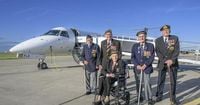On May 5, 2025, a remarkable event unfolded in Wageningen, Netherlands, as five British veterans of the Second World War were honored during commemorations marking the 80th anniversary of the country's liberation from Nazi occupation. The veterans, whose combined ages total an impressive 503 years, were flown to the Netherlands by BAE Systems, a gesture that underscores the enduring legacy of peace and gratitude between nations.
The trip, which coincided with wider Victory in Europe (VE) Day commemorations taking place across Europe, saw the veterans welcomed by an estimated 100,000 people lining the streets of Wageningen. This town holds special significance as it was here that German forces officially surrendered on May 5, 1945, bringing an end to the war in Europe. Richard Brock, a veteran of the East Lancashire Regiment who witnessed fierce fighting during the war, expressed his heartfelt appreciation for the occasion. “It was a privilege that I wouldn’t have missed for the world,” he stated, reflecting on the emotional weight of the event.
Among the honored guests was 102-year-old Marjorie Hanson, who served in the Auxiliary Territorial Service. Surprised by the scale of the welcome, she remarked, “I can’t understand why all the fuss!” as she was cheered on by families, schoolchildren, and fellow veterans from across Europe. The veterans made their way through the town in vintage World War Two jeeps, a nostalgic nod to the past, evoking memories of the sacrifices made during the war.
This year’s commemorations are particularly poignant, taking place against a backdrop of rising geopolitical tensions and a renewed focus on international cooperation. As the world marks 80 years since the end of the Second World War, Canada is also looking back to Europe, seeking to strengthen ties amidst an increasingly unstable geopolitical climate. Prime Minister Mark Carney’s recent trip to Europe instead of Washington signifies a strategic pivot, as Canada considers participating in the European Union's efforts to rearm the continent through joint military procurement.
David O'Keefe, a history professor at Marianopolis College, emphasized the importance of understanding the historical context in which Canada finds itself today. “Without a doubt, we certainly have to be much more aware of the possibility of a larger-scale conflict than we've seen in many, many years,” he said, highlighting the parallels between the current global climate and the prelude to the Second World War.
As Canada grapples with the implications of U.S. President Donald Trump’s administration, which has threatened Canada's sovereignty and economic well-being, the need for a united front among allies has never been more critical. The ongoing conflicts in Ukraine, the Middle East, and Africa have eroded the institutions established to prevent global wars, prompting calls for renewed collaboration among nations.
O'Keefe noted that the geopolitical landscape is shifting towards a tripolar world, with authoritarian regimes in China and Russia posing significant challenges. “There could be a whole lot of unexpected things that will pop up when you have something so fundamental as what is happening right now,” he cautioned, drawing attention to the precarious nature of international relations.
Reflecting on the past, O'Keefe drew a stark comparison between Canada’s current situation and that of Austria in 1938, when the country was annexed by Nazi Germany amid economic turmoil. He warned, “We’re not walking lockstep, like back in the late 1930s, but certainly the trend lines are there.” While the idea of Canada becoming a U.S. state may seem far-fetched, the unpredictability of leadership in Washington raises legitimate concerns.
In light of these challenges, experts argue that Canada must project enough strength to deter any aggressive moves from the south while maintaining a cooperative stance. Christian Leuprecht, a political-science professor at Queen's University, emphasized that Canada needs to make itself useful on the global stage by fulfilling defense spending commitments and exporting energy to eager markets.
Leuprecht pointed out that allies have largely remained silent regarding the threats facing Canada, citing British Prime Minister Keir Starmer’s lack of a robust response to Trump’s comments about annexing Canada during a recent visit to the White House. “Canada has for decades used Europe … to offset some of that power imbalance that we have with the United States,” he noted, suggesting that this approach may be crucial moving forward.
Prime Minister Carney’s efforts to engage with the European Union on joint military procurement aim to bolster the defense sector for both Canada and its European partners. Additionally, Carney has pledged to maintain foreign aid commitments, reinforcing Canada’s role in supporting global stability.
As the veterans returned to Wageningen after 80 years, their presence served as a living reminder of the sacrifices made for peace and the importance of international solidarity. The commemorations were not only a tribute to their bravery but also a call to action for current and future generations to cherish and uphold the values of cooperation and unity.
In a world where tensions are rising and the specter of conflict looms, the stories of these veterans remind us of the resilience of the human spirit and the enduring bonds forged in times of adversity. Their participation in the commemorations is a testament to the sacrifices of the past and a hopeful nod towards a future built on mutual respect and collaboration.
This report by The Canadian Press was first published on May 8, 2025.

